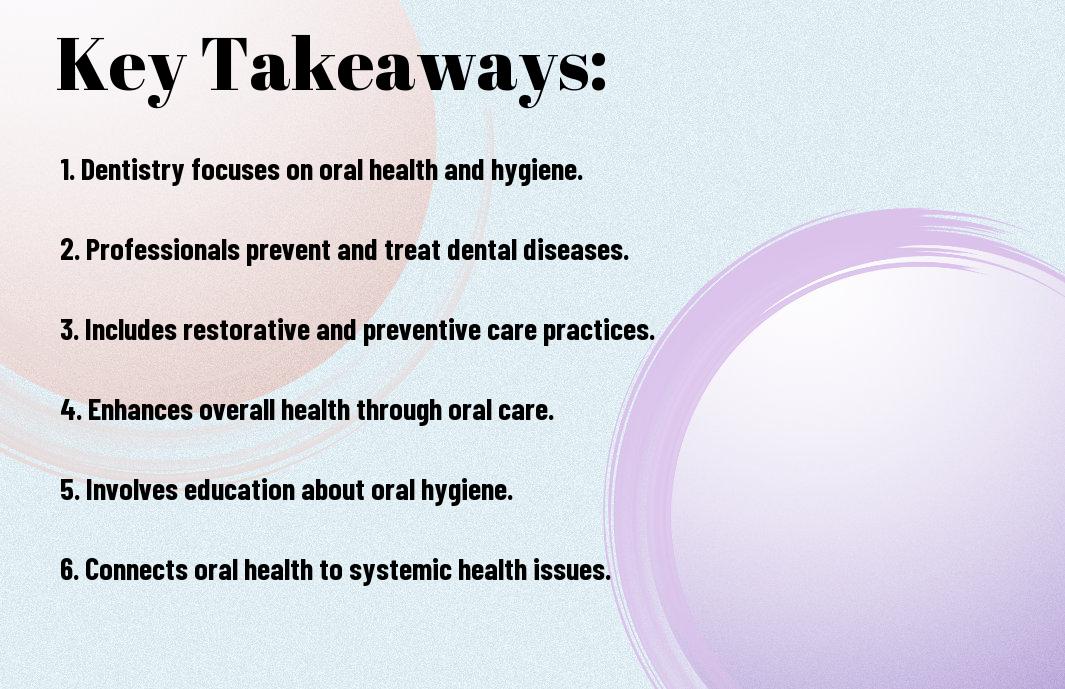Most people associate dentistry primarily with routine check-ups and toothaches, but the field extends far beyond that. Dentistry encompasses the diagnosis, prevention, and treatment of oral health issues, including teeth, gums, and the entire facial structure. As you research deeper into the world of dentistry, you’ll discover its impact on overall health, including how it can influence your self-esteem and quality of life. This blog post will provide you with a comprehensive understanding of what dentistry truly means and its significance in maintaining your well-being.
Key Takeaways:
- Dental Health: Dentistry is primarily concerned with the diagnosis, prevention, and treatment of oral diseases and conditions.
- Specialization: The field includes various specialties such as orthodontics, periodontics, and oral surgery, each focusing on different aspects of oral care.
- Patient Education: Dentists play a key role in educating patients about oral hygiene practices to maintain overall health.
- Community Impact: Dentistry contributes significantly to public health by addressing dental issues that can lead to systemic health problems.
- Technological Advancements: The field is continually evolving with advancements in technology that enhance diagnostic and treatment capabilities.

The Historical Context of Dentistry
The history of dentistry is a fascinating journey that reflects humanity’s evolving understanding of oral health. From its primitive origins to the sophisticated practices you see today, dentistry has long been intertwined with the art and science of medicine. As you explore the past, you will uncover how ancient civilizations laid the groundwork for modern dental care, turning what once were simple practices into an established field of expertise.
Ancient Practices
Across centuries, ancient cultures employed various methods to treat dental issues, often using natural remedies and rudimentary tools. Civilizations such as the Egyptians and Greeks recognized dental health’s importance, as evident in historical texts and archaeological findings, showcasing their knowledge of dental diseases and treatments.
Evolution Through the Ages
Above this foundational knowledge, dentistry saw transformative advancements throughout the Middle Ages and into the Renaissance. As you study this evolution, you will see how the profession shifted from barbers performing dental extractions to the establishment of dedicated dental practitioners, leading to improved techniques and better patient care.
Considering the monumental strides made in dentistry over the centuries, you will find that each era contributed to a greater understanding of oral health. In the 18th century, Pierre Fauchard, often called the “Father of Modern Dentistry,” introduced comprehensive dental care practices, emphasizing preventive care and restorative procedures. The 19th century witnessed the introduction of anesthesia, revolutionizing the patient experience. With the emergence of X-rays in the early 20th century, you can appreciate how technology further transformed diagnosis and treatment, paving the way for the sophisticated dental practices you rely on today.
Understanding Dentistry Today
You may be surprised to learn that dentistry has evolved significantly, encompassing much more than just routine checkups and cleanings. Today, it plays an important role in overall health and well-being, addressing a wide array of dental and oral health issues. Modern dentistry integrates technology and personalized care to enhance treatments and patient experiences, ensuring that your dental health is a priority.
Definition and Scope
For many, dentistry might seem limited to managing cavities and gum disease. However, its definition and scope extend far beyond that. Dentistry encompasses preventive care, diagnosis, and treatment of a variety of conditions affecting not just teeth, but also gums, other oral tissues, and jaw structures, ensuring a comprehensive approach to dental well-being.
Dental Specialties
Among the diverse fields within dentistry, specialists play an important role in providing targeted treatments based on specific areas of expertise. These specialties include orthodontics, periodontics, oral surgery, endodontics, pediatric dentistry, and prosthodontics, each focusing on distinct aspects of dental care.
And as you navigate your dental health, understanding these specialties can help you make informed decisions. Orthodontists correct misaligned teeth, while periodontists manage gum disease. Oral surgeons handle complex surgical procedures, whereas endodontists specialize in root canal treatments. Pediatric dentists cater to children’s unique needs, and prosthodontists fabricate dental restorations. By becoming familiar with these specialists, you can seek the right care tailored to your individual requirements, ensuring optimal oral health and a confident smile.

The Importance of Dental Health
Keep in mind that dental health plays a significant role in your overall well-being. A healthy mouth contributes not only to a beautiful smile but also to your ability to speak and eat comfortably. Neglecting your dental care can lead to severe health issues, such as infections and chronic diseases, affecting your quality of life. Taking care of your teeth and gums is an investment in your long-term health, ensuring that you can enjoy good health and vitality for years to come.
Connection to Overall Health
One of the most compelling aspects of dental health is its direct connection to your overall health. Research has shown that poor oral health is linked to various systemic conditions, including heart disease, diabetes, and respiratory issues. By maintaining good dental hygiene, you can reduce your risk of these health problems and promote a healthier body. Regular dental check-ups and cleanings can help you stay on top of any emerging issues, safeguarding both your mouth and your health.
Prevention and Education
One of the best strategies for maintaining your dental health is through education and preventative care. Understanding the importance of regular brushing, flossing, and dental visits is necessary. These activities not only help prevent cavities and gum disease but also contribute to comprehensive health awareness, empowering you to make informed choices about your oral hygiene.
Hence, prioritizing prevention and education in your dental care regimen can significantly impact your oral health landscape. By staying informed about best practices, such as utilizing fluoride toothpaste, scheduling biannual dental appointments, and adopting a balanced diet, you are taking proactive steps toward sustaining your oral health. Engaging in educational resources from dental professionals can further enhance your understanding and commitment to effective dental care, ensuring that you enjoy optimal health and well-being.
Common Dental Procedures
For maintaining optimal oral health, understanding common dental procedures is vital. Your dentist performs a variety of treatments to prevent, diagnose, and restore issues related to teeth and gums. From routine cleanings to more complex surgeries, familiarizing yourself with these procedures can help you make informed decisions about your dental care and ensure a healthier smile.
Preventive Care
To safeguard your teeth and gums, preventive care focuses on avoiding dental issues before they arise. Regular check-ups and professional cleanings are part of this approach, allowing your dentist to monitor your oral health and catch any potential problems early. Additionally, practicing good oral hygiene at home, including brushing and flossing, is vital to maintaining your smile.
Restorative Treatments
Restorative treatments aim to repair or replace damaged or missing teeth, ensuring your dental functionality and aesthetics are restored. These procedures include fillings, crowns, bridges, and dentures, tailored to meet your specific needs.
For instance, if you experience tooth decay, your dentist may recommend a filling to restore the tooth’s structure and prevent further damage. In cases of extensive damage, a crown may be needed to protect and strengthen the tooth. If a tooth is lost, options such as a bridge or denture can help complete your smile. Understanding these restorative treatments empowers you to seek timely care and improve your oral health effectively.
Innovations in Dentistry
Now, the field of dentistry is rapidly evolving, embracing innovations that significantly enhance patient care and clinical efficiency. These advancements not only improve treatment outcomes but also increase comfort and convenience for you as a patient. With cutting-edge tools and techniques, dental professionals are better equipped than ever to deliver personalized care, making your dental visits more pleasant and effective.
Technological Advancements
By incorporating state-of-the-art technology, dentists can now perform procedures with greater precision and less invasiveness. Tools such as digital imaging, 3D printing, and laser technology have transformed traditional practices, allowing for quicker diagnoses and treatments. This means you can expect faster, more accurate dental care that is tailored specifically to your needs.
Future Trends
After examining the current state of dental innovations, it’s clear that the future holds even more exciting changes. The integration of artificial intelligence and tele-dentistry is set to reshape how you engage with dental care, providing more accessible and efficient options for consultations and treatment plans.
Also, as virtual reality and augmented reality technologies gain traction, you can look forward to more immersive experiences during dental procedures. These trends aim to reduce anxiety and improve patient education, allowing you to visualize treatments better. Furthermore, advancements in regenerative medicine may lead to new methods for tooth restoration, ensuring that your dental health continues to improve with time. Overall, these innovations are paving the way for a brighter and more effective future in dentistry.
The Role of Dentists in Society
To understand the role of dentists in society, you should recognize that they are key players in promoting oral health, enhancing quality of life, and preventing diseases. Beyond treating cavities and gum disease, dentists educate you about proper oral hygiene, empower you to make informed health decisions, and often collaborate with other health professionals to promote overall wellness. Their expertise and commitment to patient care contribute significantly to healthier communities, making them indispensable members of society.
Professional Responsibilities
The primary responsibility of dentists is to provide high-quality dental care to patients, which includes diagnosing oral health issues, performing treatments, and offering preventive care. They must stay updated on the latest advancements in dentistry to ensure their techniques and materials meet the highest standards. Additionally, dentists have an ethical obligation to communicate openly with you regarding your treatment options, ensuring that you fully understand your dental health and any recommended procedures.
Community Impact
Dentists play a vital role in enhancing the health of your community. They are often involved in local outreach programs that promote dental awareness, preventative care, and access to services for underserved populations.
Considering the significant barriers to dental care that many communities face, dentists often take the initiative to organize free dental clinics or school programs that educate children about oral hygiene. These efforts not only address immediate dental needs but also foster long-lasting relationships with the community, helping to build trust and encourage regular dental visits. By working hand-in-hand with local organizations, you can see how dentists contribute to a healthier society overall.
To wrap up
Considering all points, dentistry encompasses much more than just treating teeth; it involves a comprehensive understanding of oral health that impacts your overall well-being. As a patient, you should value your dental care as a vital aspect of maintaining good health, preventing diseases, and enhancing your smile. By prioritizing your dental visits and following professional advice, you empower yourself in making informed decisions about your oral hygiene and health. Ultimately, dentistry plays a significant role in enhancing your quality of life and should be regarded as an vital component of health care.
Q: What is the definition of dentistry?
A: Dentistry is the branch of medicine that focuses on the diagnosis, prevention, and treatment of conditions and diseases related to the oral cavity, particularly the teeth and gums. Dental practitioners, known as dentists, engage in various procedures to maintain oral health, including cleanings, fillings, extractions, and more advanced treatments like orthodontics and cosmetic dentistry.
Q: What are the primary specialties within dentistry?
A: Dentistry encompasses a variety of specialties, each focusing on different aspects of oral health care. Some of the main branches include general dentistry, which addresses routine check-ups and basic care; orthodontics, which deals with the alignment of teeth and jaws; periodontics, focused on the treatment of gum diseases; endodontics, which involves root canal treatments; and oral and maxillofacial surgery, which addresses surgical procedures in the mouth and jaw area. These specialties collectively contribute to comprehensive dental care.
Q: Why is dentistry important for overall health?
A: Dentistry plays a significant role in maintaining overall health due to the direct connection between oral health and systemic health. Poor oral hygiene can lead to dental diseases, which have been linked to various medical conditions, including heart disease, diabetes, and respiratory diseases. Regular dental visits for check-ups and preventive care help to detect early signs of issues, facilitating timely treatment and promoting better health outcomes overall.






